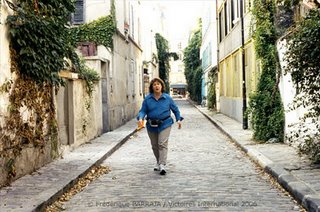

Fatima. Min Ha. Ayomide. Habibah. Rafi. Masego. Ji Wong. These are the names their parents gave to them when they were born, but today they are numbers 322-327. They're standing outside, baking under the grueling summer sun, sweating not only from the heat, but also from the fear of what will occur once they walk through the doors ahead of them. They stand in silence, gripping tightly large manila envelopes containing their passports, birth certificates, medical information … their entire lives smeared over sheets of A4 white paper. The line moves slowly, and everyone stares around them trying to paint a historical portrait of their neighbors in ten seconds or less; "what are you doing here?" Their backs and legs begin to ache as one hour becomes two then three then six, but feels like ten. Their stomachs begin to sing in unison, begging them in different languages for something to eat. Finally, the man in uniform takes a passport, glances at the photo then at the human being standing beside him, with a look of such condescension that, for a brief moment, the human being no longer feels human.
They follow the man in uniform up the stairs and enter the room on the right. They each take a number from one of those machines they recognize from the butcher shop. Only this time they are on the other end of the knife. They sit down in the metal chairs, most of them rusty and falling apart, the edges digging into their backs, but they are relieved to be finally resting. They approach the desk one by one as their numbers are called, shaking in trepidation as they stare into the eyes of the woman possessing the power to either ruin or ameliorate their lives with one signature. On what side of the bed did she wake up this morning? Will my children be able to eat tomorrow? They explain their situation, show whatever papers she asks for, then are given another number and herded into another room. It's sweltering inside and smells sort of like a grilled cheese sandwich, but they all know it's not the smell of a grilled cheese sandwich. There are no chairs in this room, and the silence that has followed them since 7 AM is now interrupted by babies screaming and the sobs of those leaving the room empty-handed, tears spilling onto their manila envelopes. "But my mother is French…" "But I've lived here for 11 years now…" "But my son is in school…" "But I can't go back there, I can't go back, I can't, I-"
Paris, France is traditionally synonymous with the Eiffel Tower, Gérard Depardieu, Impressionist paintings and any food involving cream, butter or lard. Tourists flock from all over the world to taste Alain Ducasse's latest culinary creation, to sip a coffee at Café Flore and watch the Bourgeois stroll down the Boulevard Saint Germain or to earn air miles as they run their credit cards through the machines of the boutiques on the rue du Faubourg St Honoré. Yet, for those from other countries hoping for more than just a passing visit to France's capital city, life is anything but a walk in the Tuileries Gardens…
I get the same reaction from pretty much everyone to whom I complain about the "nightmare" I've been through to secure working papers and stay in Paris: "Oh please, you're a young, pretty American female, you have nothing to worry about." Usually followed by the inevitable not-meant-to-be-racist-probably-just-ignorant-but-nonetheless-awful "They're concerned with the Africans, the Arabs, the Chinese … they're not going to bother with someone like you." Well, I hate to break it to all of you, but "someone like me" - namely an educated, 23-year old female American citizen who grew up in a New Jersey suburb and went to private school and summer camp - is no match for the French government's rigid bureaucracy. Sarkozy's veritable immigrant witchhunt has led the tens of thousands of illegal immigrants in France to fear for their lives and attempt to escape a fate of expulsion. You've probably all been reading about the tens of thousands of illegal immigrants lining up in front of government offices across the country to file applications for naturalization? Well, last week I joined these "illegal immigrants" for a fun day in the sun, aka an eight-hour romp through the streets of Paris' 17th district complete with 90-degree weather, crying babies and clouds of cigarette smoke. I believe Frommer may have left this kind of tour of Paris out of his latest guide. I've been in Paris for almost two years now, first studying, now working, and, lately, just simply finding a way to continue to live and work here has become a full-time job in its own right. I applied for my carte de séjour (residency card) as soon as I arrived in February to start my new job, went through my medical visit (which, by the way, consists of waiting in a hot smelly room only to be herded into another hot smelly room, told by a mysterious man claiming to have a medical degree to "take off your shirt" at which point an x-ray is taken of the lungs without any form of magnetic protection and, after ensuring that you do not have tuberculosis nor are you blind, deaf or allergic to foie gras, you are deemed worthy to reside in the fine French capital) and sent every document detailing pretty much every movement I made since birth to a furtive French governmental black hole. This file has since come back to me three times asking me for things - and I swear on the croissant I had for breakfast - they never once asked me for before. Finally, I went to the Prefecture in person to investigate myself which turned out to be one of the more miserable days of my life, but, in retrospect, as most miserable days turn out to be, a great learning experience.
When you stand on line with people for eight hours, you make a few friends. The chinese couple behind me spoke neither a word of English nor French, but, by the end of the eight hours, I had figured out that they were from China (hence their moniker of " the Chinese couple "), the wife is expecting a baby during the 11th month of the year, and they like to smile a lot. Fatima, from Morocco, and my self-proclaimed "best friend of the day" (Congratulations, Fatima!) explained to me that both of her parents are French but that, having grown up and gone to school in Morocco, the French government considered her to be an alien, able to care for herself and thus not eligible for citizenship in the country where her parents were born and live. Then there was the man in the wheelchair who came with his son so that his son could continue to live in France and go to school. We read about these people in newspapers all over the world - Sarkozy's "40,000 immigrés" - but they are not just numbers, they're people. People with histories and hopes, dreams and fears. People who ride the metro every day, shop in the supermarkets, go to the movies. What is a nationality anyway? Just the stamp on one's passport? My passport was issued by the United States of America, but my life is in France. From my job, my friends, my apartment, my bank account to the corner boulangerie where I buy my baguette each day, the little old man who gives me free coffee at my favorite café and my "reserved" seat for people-watching on the quai of the Seine. Every time I complain about French governmental bureaucracy, people ask me, "So why do you put up with it? Why don't you just go home?" And to them I reply, "I am home." In Alexander Payne's short, "The 14th Arrondissement," at the end of the recent film "Paris, Je T'aime," Carol, an American woman with quite possibly the worst French accent I have ever heard, sums it all up "Paris, je t'aime et je sais que tu m'aimes aussi." ("Paris, I love you and I know that you love me back.")







